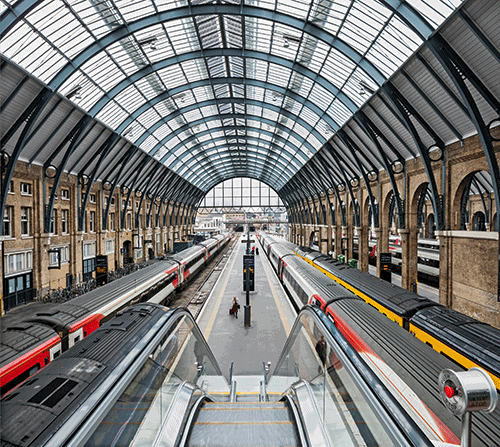 The decision to leave the EU heralds the biggest political and economic upheaval in a generation. No corner of the country will be unaffected. As yet, the implications for the rail industry remain largely unquantified.
The decision to leave the EU heralds the biggest political and economic upheaval in a generation. No corner of the country will be unaffected. As yet, the implications for the rail industry remain largely unquantified.
The impact could be huge. European legislation frames how the railway works. Who defines air quality standards? The EU. Signalling? The EU. Procurement processes? The EU. Noise? The EU. Competition rules? The EU. Separation of track and trains? The EU. The ‘Digital Railway’? In many different ways, the EU.
It’s not hard to find fault with the UK’s railway - its structure is far from perfect. But by any measure you choose, it is successful. It carries more people, more safely and more reliably than almost anywhere else. It is seen as a great place to do business, and a great place in which to invest. Why else would bankers, suppliers, contractors and operators from all over the world compete to work here?
Will the likes of Siemens, Deutsche Bahn, SNCF or CAF walk away from a stable, liberalised rail market that will continue to grow for the foreseeable future? Will Hitachi or MTR shift operations to an EU member state? Possibly… but it seems unlikely.
Ahead of the referendum on membership of the EU, the transport industry was almost universally in the Remain camp. Dissenters were few and far between. But after two hours of detailed discussion, our RailReview panel members surprised themselves with their own conclusions.
Brexit might not be the catastrophe many had predicted. It presents opportunities that could lead to more British jobs, enhancing the national skills base and attracting inward investment. It could stimulate manufacturing and benefit home-grown companies, opening the door to innovative forms of funding. It could act as a catalyst for changes that are already under way.
Certainty, stability and protection of a whole-system ethos were the key outcomes wanted by our panel. Members called for clear leadership to ensure that a relaxation of EU restrictions does not lead to some sectors of the industry acting to the detriment of others.
THE NEW TRAINS MARKET
“The new Transport Secretary is a leading Brexiteer,” observed Campaign for Better Transport Executive Director Stephen Joseph. “Chris Grayling will want to show what the benefits of leaving the EU could be.”
Is that a good thing for the industry? The decision to leave has been made, so we must now get on and deal with it.
Grayling has said it could benefit UK manufacturing, and perhaps the signs are already there. A deal in August featured Abellio retaining the East Anglia franchise with a £900 million order for 660 new Bombardier Aventra vehicles to be built in Derby. Grayling said at the time: “The decision to order rolling stock from Bombardier will ensure our train building industry in Derby remains strong.” Swiss manufacturer Stadler will also enter the UK market, with 383 vehicles as part of the deal.
“Remember the huge argument in the last Parliament when the Thameslink order went to Siemens?” asked Joseph. “Government will not feel constrained in the future by the need to observe European procurement rules. A potential strength of the Brexit deal will be the promotion of more skilled manufacturing jobs in the UK.”
“One manufacturer believes it lost the East Anglia contract because of Brexit,” commented ESG Rail’s Elaine Greenwood. “It has been forced to consider whether it needs to have an assembly plant in the UK, like Hitachi, to secure future orders.
“Because of the sudden swing in the exchange rate, the company went from having a competitive bid to not having one. Asked to confirm prices at the last minute, this one declined to do so, knowing the slump in the pound had shifted the sands so badly.”
Len Porter, former chief executive of RSSB, knew of a company enduring the opposite end of the pendulum - a smaller British supplier on the verge of a deal with a large European train manufacturer. Brexit, he said, led to feelings of uncertainty. The contract was cancelled.
But is Brexit really to blame for changes in the cycle of manufacturing?
“There was always a nod and a wink on contract talks, that you had to have a UK manufacturing facility or at least get supplies from UK companies,” said Tammy Samuel, partner at law firm Stephenson Harwood. “That is not currently allowed under procurement regulations. It still won’t be allowed following Brexit, unless we start repealing legislation.
“If that does change as a result of Brexit, with new weighting towards domestic manufacturing during evaluation of bids, then it could lead to UK firms getting more orders or newer ones following the Hitachi model of building a final assembly plant. It could therefore encourage inward investment.”
Martin Fleetwood, a board member of UK Tram, commented that Brexit has coincided with a policy shift towards more new rolling stock. Britain is moving away from refurbishing older trains.
Tim Durham, whose job at Macquarie is to finance rolling stock deals, agreed that the shift had started before the Brexit debate. He thought the decision to leave the EU would not produce a radical change.
“There was a change in franchise specifications to have a more qualitative scoring bias towards new trains,” Durham explained. “There are more new trains than anyone expected. At the same time there is cheap financing worldwide. So the combination of more trains, cheaper trains and cheaper money means that buying new is cheaper than refurbishing old trains.
“It is a macroeconomic thing, not a Brexit thing. Remember Hitachi are doing final assembly here, not manufacturing, and they built a site for one specific order. It will be interesting to see what Siemens do. They consider the UK a home market - they are not a big supplier in Germany. Will they feel forced into following Hitachi?”
RSSB Managing Director Mark Phillips responded that there is a limit to how much more rolling stock is likely to be ordered. A couple of big contracts are on the horizon, but then it would tail off, he said.
“If you are not already here, and you are only going to win one in every three or four bids that you submit, that is a big investment to overcome when the pricing is very competitive.”
Chris Jackson, head of transport sector at lawyer Burges Salmon, felt there was much to lose if the competition for contracts openly favoured companies manufacturing in the UK.
“A genuinely liberalised market has been maturing here over 20 years. It is not the only liberalised market. But it is the most advanced. It is not perfect, but the competition is fair.
“That is a huge strength because companies will want to continue to be part of it. The problem will occur if the procurement and state aid rules are amended specifically to build in a home preference. That starts to undermine the credibility of what is a trusted market at the moment.
“That central trust element is very important, and Brexit could significantly influence that.”
RAIL INDUSTRY PERFORMANCE:
(DRIVEN BY MIGRATION?)
During the referendum campaign, the issue of migration dominated the Brexit debate. Yet during the panel discussion it was barely mentioned.
Chris Cheek, of The TAS Partnership, wrote in the partnership’s latest Rail Industry Performance report that changes in migration rates may have a significant impact on rail. The UK rail market is dominated by London, which also has a disproportionate amount of national inward migration.
“The recent strong growth in the population caused by both migration and a recovery in the birth rate has undoubtedly had an effect on the demand for transport, particularly in London,” he wrote.
“Since the privatisation of the railways in the mid-1990s, the population of the UK has grown by more than 7.4 million people, a rise of 13.3%. Greater London has grown by over 1.5 million people, a 22.5% increase.”
According to ONS Labour Force Survey data (see graphs above), the number of people employed in London has increased by almost 1.4 million (more than 40%) over the same period. So a change in the rate of migration could influence rail in London at a rate approaching double that of the nation as a whole.
Cheek said: “According to our latest report the private sector train operators made between them an operation profit of £273 million in 2014-15. That was on a total turnover of £10.9 billion, and represented a margin of 2.5%. It represents just 16.5p per journey out of the average fare of £5.32.
“Between them the operators paid a net £659m into the Treasury in premium payments for the rights to run the trains. So the Government earned twice as much as the operators.
“This is a different picture to the one painted by politicians and the media. There are deep-rooted industrial relations issues and ongoing capacity problems. But these will not be solved by changing the ownership or by other wholesale reorganisation of the system. Government still controls many aspects of the network, including regulated fares, service levels, rolling stock policy and investment levels. It owns the infrastructure, too. People need to know that these issues are already settled in Whitehall.”
A ‘WHOLE SYSTEM’ APPROACH
“There will be many bits of the industry looking to get out of onerous standards requirements,” thought Mark Phillips.
“The risk is that things to change could be picked out in isolation. It is most important that we look at the system as a whole.
“If you start to change the standards required for infrastructure - I could cite the overhead power lines on the Great Western - that could have implications for designers of pantographs and the providers of the power supply. I think there will be pressure to amend European standards, and I think therefore there will be a need for clear impact assessments.”
Martin Fleetwood felt there would be a desire for the UK to have quicker decisions on standards than is possible under a system that relies on achieving pan-European agreements. Could we, he asked, have more rapid progress on the interface between light rail and heavy rail?
“In Europe the system is pretty heavily defined in terms of standards,” Phillips countered. “It would be disappointing if we suddenly started to unpick that. We will need to protect what is good about European standards, so that manufacturers in the UK can still export into the European market. We do not want to close that down.”
If the UK follows the Norway/Iceland economic model, the EU will continue to set standards which the UK will have to follow without having any say in them.
“European standards dictate what happens over here, and to a large extent that won’t change,” opined Stephen Joseph.
Tammy Samuel questioned whether European rules would be needed all the time. She pointed to a forthcoming order for 250 nine-car trains for London Underground, with Hitachi and Siemens joining forces to bid despite London Underground stock not being built to European standards.
“Why do we need to stay the same when they are already used to having a rolling stock platform they can adapt to different markets?” she asked.
Len Porter summed up the panel’s thoughts: “There is a threat to systems thinking. Network Rail thinks infrastructure; operators think about train services. It is now more important that the Rail Delivery Group really starts thinking about the system as a whole. Different groups cannot just go and make their own post-Brexit amendments to suit their needs, because that could be to the detriment of the industry in general.”
THE ECONOMIC IMPACT
Halfway through the debate, it was pointed out that no one had yet mentioned the effect on passengers.
“If you asked Chris Grayling, he would say that the railway does not work for passengers because it is full of people throwing contracts at each other,” said Stephen Joseph. “His view is that Brexit gives an opportunity to get out of that - a chance to have more integration between track and train.
“I told him the people who are most into this are the people in his own department, who spend their time working out which boxes have been ticked rather than working out what would benefit passengers.”
Tammy Samuel countered: “Our record is not good on integration. The SWT Deep Alliance with Network Rail failed. The experience in Scotland has not been terribly positive.”
Samuel is working with Transport for London on Crossrail. TfL will be the authority, the infrastructure manager and the controller of services. Yet European legislation requires the separation of track and trains.
“It can be done,” she said. “We decided to stop being vertically integrated long before Europe did. Brexit won’t necessarily alter that.”
“Germany and France made absolutely certain there was plenty of wriggle room to allow vertically integrated operations,” said Chris Jackson. “You just need to be careful how it is done.”
Most economic commentators think there will be a lessening of economic activity, at least temporarily, during the Brexit process. With less tax revenue, the Government may seek to spend less. It could turn to a Network Rail no longer beholden to European standards.
“Cancelling HS2, delaying electrification - these schemes could fall off a cliff,” warned Stephen Joseph. “Or it could go the other way. The Government might spend more on infrastructure to stimulate the economy. Brexit is both a threat and an opportunity, and it is too early to predict which it will be.”
“We can now make our own rules about funding, about state aid,” said Chris Jackson.
“Under European rules, the state cannot give an advantage to one commercial operator over another. If we relax those rules to have innovative partnership arrangements which have a commercial element in the mix, Brexit potentially gives the Government the ability to have new funding models.”
Will the UK seek to protect its own markets, possibly with state intervention? Although this could encourage home-grown jobs and promote skills, no one on the panel thought it would be constructive to discourage European firms that already have a strong grip in the UK.
“It was an unspoken rule that there were some markets in the EU where it was pointless bidding,” said Elaine Greenwood. “Decisions were made before looking at the bids. That is only going to get worse after Brexit. Protectionism will be a bigger factor.”
Tammy Samuel: “Will the foreign-owned train operators be put off bidding? The likes of Abellio, Arriva and Keolis? National Express is, in fact, mainly Spanish. Will we be limited to Stagecoach, First and Go-Ahead?
By leaving Europe, are we restricting ourselves to the UK competitors and restricting their abilities to bid in other European countries?”
Tim Durham, of Australian investor Macquarie, could take a non-European perspective. “Macquarie’s point of view is that London remains a global trading centre, and we don’t think its influence will change a great deal. We don’t think there will be tumbleweed blowing down City streets.
“We have a very strong financing market for rolling stock. There is so much interest in UK rail investment. But if you start to play with the structure in a big way, it will scare off investors and they will go somewhere that is more stable.
“The UK rail system has its moments, and people like to criticise it. The market works reasonably well, and you don’t want to mess with that too much.
“We want to have plenty of people in the market place. To have only two bidders for a rail franchise is not good. We need European bidders in this market.
“The first test will be the financing of new trains for East Anglia. £1.5bn is a lot to raise. I think the money is there and I think it will get signed.”
Chris Jackson added: “People will continue to invest in UK rail provided there are not wholesale changes to the liberalised market.”
Mark Phillips replied that the Department for Transport would continue to seek the lowest cost operations, and would therefore not wish to pencil in British bidders to the exclusion of others.
Tammy Samuel: “The system ain’t broke. Perhaps the Government should get on with the really important issues around Brexit and just leave transport to get on with it.”
“There is an interesting comparison with the bus industry,” commented Stephen Joseph. “Right now the Government is working on the Bus Services Bill, which allows for extension of franchising outside London. The British companies are defending their territories. Some of the foreign state-owned operations in rail are starting to look at the bus networks. If there is decent competition they will bid.
“Go-Ahead announced £100m profits, and nearly all of that came from buses. These operators are marking large returns. A franchising operation giving lower returns but fixed over longer periods will be attractive to new entrants. It could be more attractive to state-owned operations from abroad than to companies like Stagecoach. So I would play down the idea that non-UK bidders could get cold feet.”
CONCLUSIONS
During the referendum campaign, the transport industry almost universally supported remaining within the EU.
Many of the biggest train operating groups and a majority of companies in the railway supply chain are international organisations trading globally. Some are based in the UK. Others have substantial UK operations but have their origins elsewhere.
The only substantial transport sector opposition to the Remain camp came from the RMT union, which argued that the EU would prohibit the return of the whole industry to public ownership. Most unions and the TUC favoured Remain because of EU protection for workers’ rights, including the Working Time Directive and safety regulations.
So there was an expectation ahead of the panel meeting that Brexit would spread unease and uncertainty, leading to a reluctance to invest. At the very least, there would be a slowing down in the rate of growth in rail passenger numbers.
Opinions changed!
“I feel slightly more positive,” commented Elaine Greenwood of ESG (a company, let’s not forget, owned by Deutsche Bahn). “I thought Brexit would be very messy. After a sensible discussion I can now see the potential for some benefits.”
Her view was echoed by others on the panel.
Len Porter: “I was quite surprised to hear from everyone that Brexit may not have the severity of impact that many of us thought. It is a challenge that needs to be managed. It doesn’t feel such a negative thing.”
Tammy Samuel: “If the industry is going to carry on largely unaffected by Brexit, we need to get that out there. The last thing the railway needs is more uncertainty. We have had so many reviews, so many flip-flops, so many franchising stops and restarts. The best thing that can come out of this is that we carry on more or less as we are now. Any change should be gradual.”
Stephen Joseph: “I think the divergence of standards issue is very important. We need to ensure that it does not hinder the opportunity to increase the export of rail expertise and services. And the potential changes to rules governing state aid also present a possibility for new ways of funding, especially for devolved government.”
The UK is Europe’s most liberalised market. It is seen as fair. Should the UK Government become more protectionist following Brexit, this could be a way to encourage UK jobs. But the negative effect of discouraging international suppliers was seen by the panel as the greatest danger in the new economic order.
The panel’s key conclusion was that when we go from EU standards to UK standards there is a significant risk that we screw around with the system as a whole. We could keep the bits we want and discard some we don’t. But we could realise afterwards that we have messed up a whole system that actually works quite well.
There was no clarity about how Brexit will proceed. The Prime Minister has repeated the mantra of “Brexit means Brexit” without yet defining the meaning. And Brexit Minister David Davies has suggested it is unlikely Britain will remain part of the single market.
But if the industry does not lobby for its interests from the earliest opportunity, it risks losing out.
The panel called for a clearer focus and greater leadership from the Rail Delivery Group. An integrated system-wide approach to the challenges posed by Brexit is needed. Network Rail and other components of the rail system should be encouraged not to act in isolation as they seek to adapt to the new environment.
Brexit is seen as neither a good nor a bad step for the industry. Compared with shipping, aviation and road transport, the effects are expected to be less significant. It presents some positive opportunities, offering a catalyst for changes that were likely anyway. It should not be used as an excuse if those opportunities are not taken.

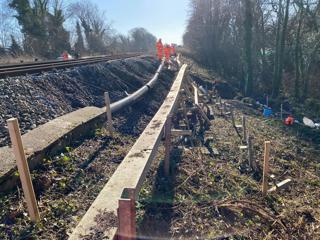
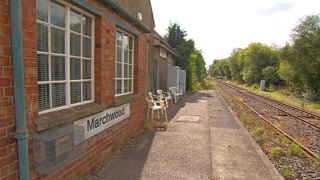
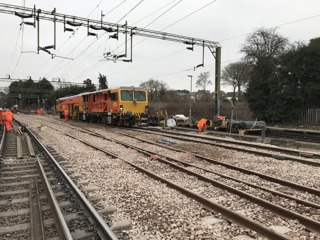
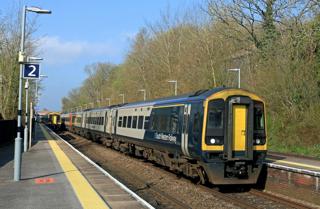
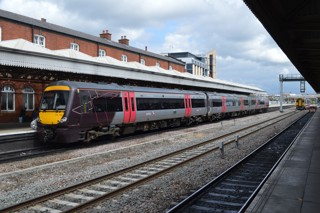











Login to comment
Comments
No comments have been made yet.